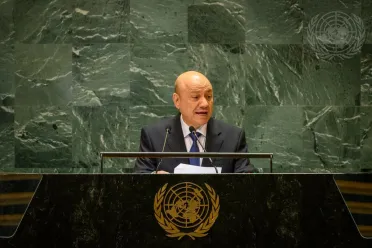Statement
Statement summary
RASHAD MOHAMMED AL-ALIMI, President of the Presidential Leadership Council of Yemen, reaffirmed the Yemeni Government’s commitment to achieving a “just and comprehensive peace”. In light of the escalation of violence from the Houthi militias, he called for a “collective approach to support the Government of Yemen” and ensure implementation of resolutions prohibiting the flow of Iranian weapons. “Leniency with the enemies of peace leads to the most heinous wars,” he warned, noting that the militias will not engage in any peacemaking efforts. Despite the truce approved by the Yemeni Government in 2022 and efforts to de-escalate, the Houthis continue to commit violence, hijacking planes, attacking oil facilities and issuing racist orders and laws. Against this backdrop, he called on the international community to “take firm policies” and push the Houthis towards peace, in line with resolution 2216 (2015).
Turning to the “arrest” of the UN personnel by the Houthis, he said “there is widespread belief that the UN is responsible” for giving militias this opportunity. He stressed that the UN’s decision to keep its headquarters in Sana’a — despite the Yemeni Government’s call to move it to Aden — has “unintentionally enabled these terrorists” to take UN personnel hostage and use them as a bargaining chip. “This ongoing situation can be neither defended nor justified,” he emphasized, adding that “the presence of the UN headquarters in Sana’a emboldens these militias”. There is a need to reconsider these policies, he asserted.
The Houthis’ terrorist attacks on international maritime navigation threaten not only Yemen, but the stability of the region, he said, detailing a recent attack by the Houthis on the crude oil tanker Sounion, which caused fires and risked being “one of the worst oil spills in history”. Pointing out the devastating economic impact of these attacks, which have deprived Yemen of vital resources needed for salaries and services, he urged the international community to provide comprehensive support for Yemen to address the dire humanitarian conditions and “to lay the foundations for long-term economic recovery”. “The stability of Yemen is decisive in safeguarding peace and stability in the region and trade routes in the Arabian Sea,” he stated.
On the wider regional affairs, he called “to put an end to the false rhetoric concerning the issue of Yemen”, which minimizes the role of Tehran. “Iran has been manipulating the just Palestinian cause,” he said, accusing that country of using blackmailing and propaganda that undermined the peace process in the Israeli-Palestinian conflict as well in Yemen, urging an end to the ongoing conflicts and the achievement of lasting peace in the region.
The Chairman of the Presidential Leadership Council of Yemen called on Thursday for increased international pressure to dry up sources of funding for Houthi militias and to curb “the flow of Iranian weapons” into his country, which was constantly working to de-escalate tension.
*****
“A collective approach is necessary to assist the Yemeni Government to reinforce its institutional capabilities,” its capacity to address the ongoing economic crisis and protect against threats to international navigation,” Rashad Mohammed Al-Alimi told world leaders at the UN General Assembly’s annual high-level meeting.
Focusing largely on what he saw as the ever-present threat of escalation by Iran-backed Houthi militias, Mr. Al-Alimi said that without stepped-up efforts and assistance to tackle this threat, “the militias will not engage in any efforts to seek a comprehensive peace”, nor would they refrain from “blackmailing” the region and wider international community.
He argued that such efforts should include not only immediate humanitarian assistance but should extend to measures that would engender “stronger accountability mechanisms, especially in militia-controlled areas,” as well as greater investments in infrastructure, healthcare, education and sustainable development.
The Government had recently suspended its decision to move its banking headquarters from Sana’a, which is under Houthi control, to the temporary capital in Aden, heeding the call of the UN and the international community to de-escalate, he continued.
This decision could hold “provided the Houthis engage in serious talks towards alleviating the country’s economic crisis and to revive the peace efforts in line with the roadmap mediated by Saudi Arabia and Oman.”
Despite these and other efforts at de-escalation, Houthi militias had hijacked three Yemeni Airlines planes, launched drone attacks against the Safer oil facility, and issued “racist orders and laws” to ensure the nomination of their affiliates to public positions.
This ongoing pattern of reckless escalation required the international community to take firm policies and push the militias towards the choice of peace, in line with international resolutions.
He said Yemen’s years-long economic crisis continued to be exacerbated by Houthi violence and terrorist attacks, including in the Red Sea and surrounding waterways, which impacted not only the region but threatened trillions of dollars in global trade, and against oil facilities, which hampered the ability of the Government to pay workers and provide public services.
This ongoing “economic war” being waged by the Houthis “is part of a larger strategy aimed at weakening the Government and aggravating the humanitarian crisis facing 14 million Yemenis.”
Against this background, Mr. Al-Alimi underscored: “Yemen’s recovery is not just a national issue, but a regional and global need, as its stability is crucial to maintaining peace and security [locally] as well as vital trade routes in the Red and Arabian Seas and surrounding waterways.”
Regarding the situation in the wider Middle East, Mr. Al-Alimi said, “The brutal Israeli war on the Palestinian people must stop immediately. That is the key to the desired peace, and an entry point to lifting the cover from Iran’s and its agents’ pretexts to exacerbate the situation in the region.”
Full statement
Read the full statement, in PDF format.
Photo

Previous sessions
Access the statements from previous sessions.
